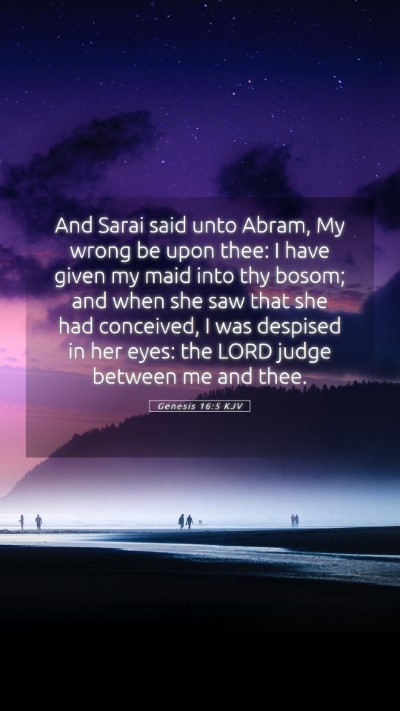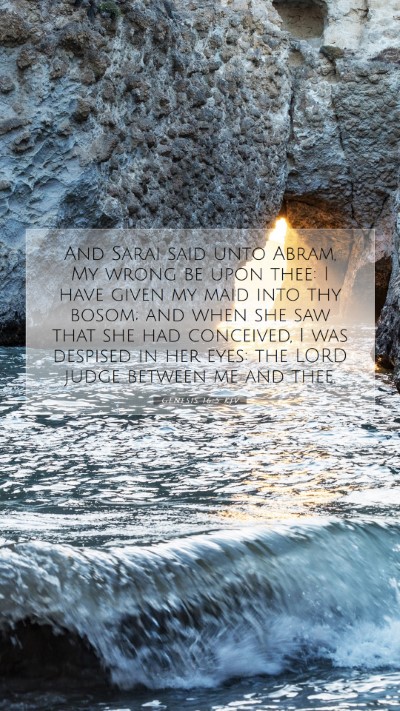Understanding Genesis 16:5
Genesis 16:5 reads: "And Sarai said unto Abram, My wrong be upon thee: I have given my maid into thy bosom; and when she saw that she had conceived, I was despised in her eyes: the Lord judge between me and thee."
This verse captures a critical moment in the narrative of Abram and Sarai, addressing themes of shame, responsibility, and divine justice.
Contextual Overview
The backdrop of this verse is the story of Abram (later Abraham) and his wife Sarai (later Sarah), who were promised a progeny by God despite their old age. Sarai, doubting the fulfillment of this promise, gives her maid Hagar to Abram to bear a child. This action reflects the cultural practices of the time but leads to conflict within the household.
Commentary Insights
-
Matthew Henry's Commentary:
Henry emphasizes the consequences of Sarai's decision to offer Hagar to Abram, which was intended as a solution to her despair over barrenness. However, Sarai's jealousy and the resulting conflict illustrate human failings when trying to fulfill divine promises through human means.
-
Albert Barnes' Notes:
Barnes notes that Sarai's accusation against Abram reveals her bitterness and sense of betrayal. Sarai feels wronged not only for the situation with Hagar but also for the lack of understanding and support from Abram, highlighting the interpersonal strife that can arise from hasty decisions.
-
Adam Clarke's Commentary:
Clarke draws attention to Sarai's emotional turmoil. Her regret and feelings of being despised underscore her pain and insecurity. This passage underscores the complexity of human relationships and the emotional aftermath of choices made in desperation.
Meanings and Applications
This verse invites readers to reflect on several key themes:
- Human Responsibility: Sarai's insistence on blaming Abram highlights how often we seek to shift responsibility rather than facing the consequences of our actions.
- Divine Judgment: Sarai calls upon God to judge between them, indicating her awareness of the moral implications of their actions and the need for resolution beyond human capability.
- Consequences of Doubt: The passage serves as a reminder of how doubt in God's promises can lead to actions that complicate our lives and relationships.
Cross References
- Genesis 12:10-20: Abram and Sarai’s journey into Egypt and the consequences of Sarai's beauty.
- Genesis 21:9-10: The conflict that arises after the birth of Isaac and the expulsion of Hagar and Ishmael.
- James 1:14-15: The nature of temptation and how it leads to sin and ultimately death, applicable to Sarai’s choice.
Conclusion
Genesis 16:5 serves as a powerful illustration of the complexities within human relationships when confronted with divine promises. Through Biblical exegesis and a deep dive into its implications, this verse encourages believers to seek understanding and wisdom in their decisions, aligning more closely with God's intentions.
This analysis can serve as a valuable resource for Bible study groups, providing insights that can lead to meaningful discussions on the themes of responsibility, relationships, and divine justice.
For those seeking to deepen their Bible verse understanding, exploring such verses can open avenues for reflection on personal experiences and faith.


